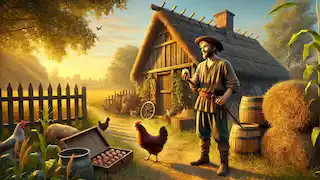Once upon a time, in a quaint village nestled between the rolling hills, there lived a humble farmer named Jacob. Jacob wasn't wealthy, nor did he possess the vast lands that stretched for miles like some of the wealthier landowners in the region. But what he did have was a content heart and a few livestock that provided enough for him to live a simple life. Among his livestock was a single hen—small, brown, and seemingly ordinary, but with time, this hen would come to change Jacob's fate forever.
Every morning, Jacob would rise at dawn and go about his chores. He would feed the animals, tend to his crops, and gather the few eggs his hen laid. But one day, while he was collecting eggs as usual, he found something extraordinary. Nestled among the regular eggs was one that gleamed with a golden hue. At first, Jacob thought it was a trick of the morning sun, but as he held it in his hand, he realized it was indeed solid gold.
Jacob was taken aback, unsure of what to do with such a valuable find. He stared at the egg for a long time, weighing its significance in his mind. The egg could buy him riches beyond imagination, or it could be a one-time stroke of luck. Would the hen lay more golden eggs? Should he tell anyone about this discovery?
He decided to keep it a secret, at least for the time being. He tucked the egg away in a small wooden chest he kept hidden under the floorboards of his house. The next day, he returned to check on his hen, and to his astonishment, there was another golden egg waiting for him. Days turned into weeks, and every morning without fail, the hen laid a golden egg. Jacob's small wooden chest was quickly filling up with the valuable eggs. At first, he felt overjoyed by his newfound wealth, but soon he realized that having so much gold in secret was both a blessing and a burden. He couldn’t simply take the eggs into town and sell them without raising suspicion, so he sold just enough to keep up appearances, buying new clothes and repairing his home, but never enough to draw too much attention. However, Jacob’s luck couldn’t remain hidden forever. One day, his nosy neighbor, an envious man named Henry, noticed Jacob’s sudden improvements. The freshly painted house, the new shoes, and the whispers of wealth that began to spread in the village all piqued Henry’s interest. He became determined to find out where Jacob's fortune was coming from. Late one evening, Henry crept onto Jacob’s farm under the cover of darkness. He peered through the windows of Jacob’s home, hoping to catch a glimpse of the farmer’s secret. And there, in the dim light of a flickering candle, he saw it—the small wooden chest filled with golden eggs. Henry’s eyes widened, and a wicked smile crept across his face. He knew he had to have those eggs for himself. The next morning, Henry paid Jacob a visit, pretending to be friendly. He asked about Jacob’s farm and made idle conversation, but Jacob, being a humble man, didn’t reveal his secret. However, Henry was not easily discouraged. He began plotting ways to steal the golden eggs and make their fortune his own. As the days passed, Henry’s jealousy grew, and he couldn’t wait any longer. One night, he broke into Jacob’s house, determined to find the chest. He tiptoed through the dark house, carefully avoiding any creaky floorboards, until he found the chest hidden beneath the floor. His hands trembled with excitement as he lifted the lid, revealing the glimmering treasure inside. But as Henry reached out to take the eggs, something unexpected happened. A shadow loomed over him. It was Jacob. Jacob had suspected that someone would try to steal his treasure, and so he had been keeping watch. Seeing Henry hunched over his chest of golden eggs filled Jacob with both anger and sorrow. "Why, Henry? Why would you do this?" Jacob asked, his voice heavy with disappointment. Henry, startled and ashamed, couldn’t find the words to explain his actions. He had let greed take over, and now he was caught. In a moment of desperation, he pleaded with Jacob, saying he only wanted to share in the fortune, that he had no ill intentions. But Jacob wasn’t easily swayed. He knew that greed, once unleashed, could destroy everything. "You don’t understand, Henry," Jacob said, closing the chest and locking it securely. "These golden eggs have brought me nothing but worry. Every day, I live in fear that someone will discover my secret and take everything from me." Henry’s eyes darted to the chest, still longing for the treasure inside. "But the eggs, they could make us both rich beyond our wildest dreams!" "Perhaps," Jacob replied, his voice calm but firm. "But what good is wealth if it turns people into thieves and enemies? I would rather live a simple life with an honest heart than be consumed by greed." Henry hung his head in shame. He realized the error of his ways, but the allure of the golden eggs was too strong. In a final act of desperation, Henry lunged toward the chest, trying to pry it open once again. In the struggle, the chest toppled over, and one of the golden eggs fell to the floor, cracking open. But what spilled out was not gold. Inside the golden egg was nothing more than sand. Fine, shimmering sand that sparkled in the light but held no real value. Henry stared at the sand in disbelief, unable to comprehend what had just happened. "But... how?" he stammered. "The eggs... they were solid gold!" Jacob looked at the sand and then back at Henry. "Perhaps the eggs were never meant to bring wealth, Henry. Perhaps they were a test—a test of character. And in the end, greed has made fools of us both." Henry, realizing the futility of his actions, left Jacob’s farm in silence. He had lost not only the treasure but also his dignity and self-respect. Jacob, too, felt the weight of the situation, but he knew that he had made the right decision in guarding his secret. From that day on, Jacob never collected another golden egg, and the hen returned to laying ordinary eggs. But the lesson Jacob learned stayed with him for the rest of his life. He understood that true wealth wasn’t measured in gold or material possessions but in the richness of one’s heart and the peace that comes from living an honest life. Years passed, and Jacob grew old. He continued to live his simple life, never boasting about the golden eggs or the fortune he could have had. The village never knew of his secret, and Henry, too, kept his silence, for he had learned the hard way that greed could lead to ruin. One crisp autumn morning, as the leaves fell from the trees in vibrant hues of orange and gold, Jacob sat on the porch of his small home, watching the world go by. The hen, now much older, still clucked around the yard, laying her daily eggs. Jacob smiled, content in knowing that he had lived his life with integrity, free from the burden of greed and envy. As the sun set behind the hills, casting a warm golden glow over the village, Jacob thought back to the days of the golden eggs. He realized that the real treasure had always been the simple joys of life—the quiet moments, the honest work, and the peace that came from knowing he had done the right thing. And so, as the last light of day faded into the night, Jacob closed his eyes with a heart full of gratitude. He had discovered the true meaning of wealth, and it was a lesson he would carry with him into eternity. The legend of the golden eggs became a tale passed down through the generations in the village. Parents would tell their children about the humble farmer who found a fortune but chose to live simply, teaching them that happiness comes not from riches but from the contentment of a pure heart. As the years went by, the story of Jacob and his hen became a cherished part of the village's folklore. Some believed the tale was merely a fable, while others wondered if the golden eggs had been real. But for those who understood the deeper meaning, it was a story that reminded them of the dangers of greed and the value of living an honest life. One day, a curious young boy from the village, hearing the legend of the golden eggs, wandered up to Jacob’s old farm, which had long since been abandoned. The house was still standing, though weathered by time, and the fields were overgrown with wildflowers. The boy approached the old hen’s coop, half-expecting to find some trace of the golden eggs. But when he peeked inside, he found only a few scattered feathers and a single ordinary egg resting in the straw. Smiling to himself, the boy picked up the egg and turned to leave, understanding that the real magic of the story wasn’t in the golden eggs themselves but in the wisdom they represented. And as he walked back toward the village, he carried with him the same lesson Jacob had learned all those years ago: that the true treasures in life cannot be bought or sold—they are found in the heart. Years later, the story of Jacob and his golden eggs continued to be told, not just in the village but far beyond its borders. It became a tale of caution and wisdom, a reminder that wealth and power are fleeting, but the values of kindness, integrity, and contentment are everlasting. And so, long after Jacob had passed from this world, his legacy lived on. The village flourished, not because of gold or riches, but because the people had learned the value of honesty and humility . They cherished their simple lives and took pride in their work, knowing that true happiness came from within. As for the young boy who had found the single egg in the abandoned coop, he grew up to be a wise and respected man in the village, often sharing the story of Jacob with others. He never sought riches or fame, for he had learned the greatest lesson of all: that a golden heart is worth far more than any golden egg. And so, the tale of "The Golden Eggs" came to an end, not with a treasure chest full of riches, but with a village full of people who understood the true meaning of wealth.*
*
*
*
*

*

*
*

*



















